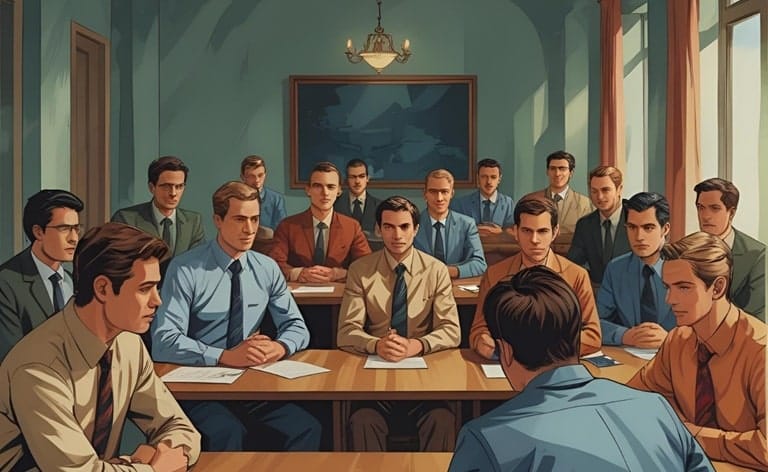It’s a scenario that frustrates hiring managers and search partners alike: a candidate who breezes through every stage of the process—brilliant resume, strong references, even a flawless panel interview—only to fall flat in the final round with the CEO or the Board.
Why does this happen, especially when we’re talking about top C-level candidates? The answer is rarely about competence. Instead, it’s about alignment, judgment, and presence—factors that are too often under-assessed until it’s too late.
Here’s a breakdown of why these high-potential candidates stumble at the last and most critical hurdle—and how to fix it.
Pro Tip: Preventing this late-stage failure requires a more robust assessment of executive candidates to ensure alignment long before the final round.
1. A Mismatch Between Initial Screening Criteria and Final-Round Expectations
Many C-level candidates fail in the final round because they were never actually screened for what matters most to final decision-makers.
Here’s the disconnect:
Initial screening, often driven by HR or search coordinators, emphasizes technical experience, résumé credentials, and domain expertise. But when the final round arrives—often with the CEO, PE sponsors, or the board—the focus shifts entirely.
Now, the candidate is being evaluated on:
- Strategic vision
- Executive maturity
- Stakeholder alignment
- Ability to influence at the highest level
In essence: the process sets them up to succeed on paper but fail in the boardroom. This is the classic mismatch between initial screening criteria and final-round expectations.
Solution:
Start with a clear, consensus-driven success profile. Every stakeholder—HR, hiring managers, board members—must agree not just on the hard skills but on the leadership traits, interpersonal dynamics, and strategic mindset required. Retained search partners like JRG Partners insist on building this scorecard before the first candidate is even approached.
2. A Fatal Gap in Leadership Judgment or Cultural Alignment
C-suite interviews aren’t about proving competence. They’re about revealing judgment. Final decision-makers want to know: Will this person make wise decisions under pressure—especially when there’s no playbook?
Even stellar candidates can expose a fatal gap in leadership judgment or cultural alignment when pushed beyond rehearsed answers. Maybe they show rigidity in thinking, a lack of self-awareness, or arrogance disguised as confidence. Maybe their values or decision-making style feel out of sync with the company’s operating ethos.
These aren’t flaws easily visible on a résumé—or even in structured interviews. But when board members probe “how would you handle X,” or challenge them with ambiguous, emotionally charged scenarios, this deeper layer of leadership emerges.

Solution:
Design earlier interviews to test for judgment and values—not just accomplishments. Include unstructured conversations, hypothetical scenarios, and value-based challenges. Candidates who can’t navigate these fluidly should never make it to the final round.
3. Failure to Assess for ‘Boardroom Readiness’ and Executive Presence
Some candidates are fantastic operators. They lead large teams, execute flawlessly, and deliver results. But when they step into a room with seasoned executives, something’s missing.
They can’t own the room.
They don’t speak with conviction.
They fumble when challenged.
They don’t project gravitas.
This is a classic failure to assess for boardroom readiness and executive presence—two traits that are often taken for granted but rarely measured with rigor until the final stage.
And by then? It’s too late.
The board doesn’t want to train someone to act like an executive. They want someone who is one.
Solution:
Executive presence should be a Day One filter, not a final-round surprise. At JRG Partners, we assess this trait during the very first conversation. We use C-level psychometric benchmarks, executive simulations, and proprietary assessments to ensure that by the time a candidate reaches the final interview, they’re not just ready for the role—they’re ready for the room.
Often, these final-round failures stem from a deeper issue, where the interview process relies too much on gut feel rather than on objective, data-driven metrics.
Final Thought: It’s Not the Candidate. It’s the Process.
When strong candidates fail late in the process, it’s rarely due to a lack of talent. It’s a breakdown in alignment, calibration, and early-stage rigor.
At JRG Partners, we believe every candidate presented in a final round should already be vetted for:
- Strategic alignment
- Leadership judgment
- Cultural fit
- Boardroom readiness
That’s the difference between transactional recruitment and transformational executive search.
Because in the C-suite, there’s no room for guesswork at the finish line.
Need help building a process that gets it right from the start?
Contact JRG Partners—and let’s make sure your next finalist becomes your next great hire.


